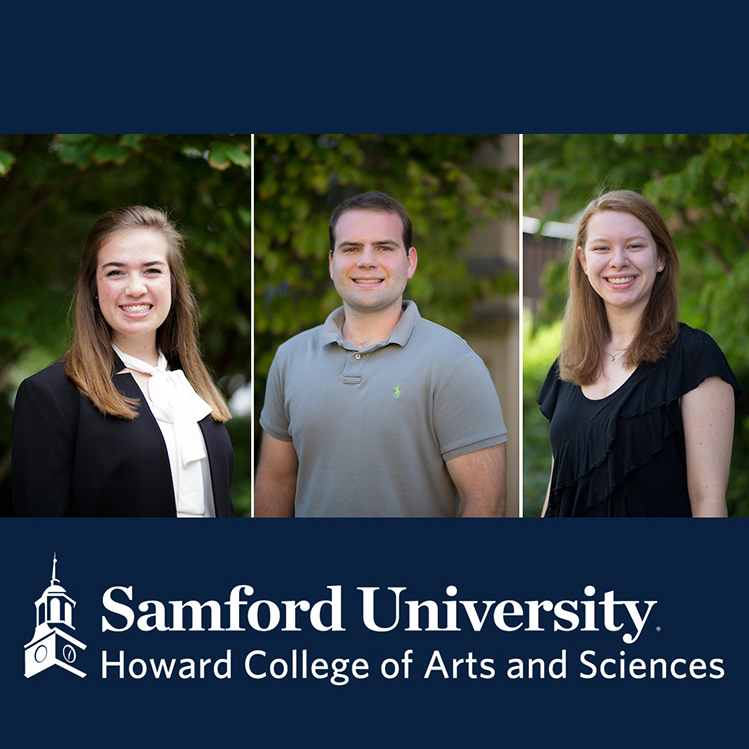
Three outstanding chemistry and biochemistry students in Samford University's class of 2020 highlighted the importance of mentoring in a department that emphasizes faculty-led research.
Hannah Hynds–recipient of the Outstanding Senior Chemistry Student Award–didn’t vary much from her original aim as a freshman. “I have always loved science and learning how the world works, and when I came to Samford I knew I wanted to be a chemistry major,” she said. Her adviser, Morgan Ponder, helped guide her to a chemistry/biochemistry double major with a biology minor. She then dove deep into “the central science” with independent research mentor Dale Wilger, a key figure in shaping her future plans. “Dr. Wilger played a huge role in helping me decide where I wanted to go after I graduated from Samford, and gave me the means and encouragement to reach that goal,” Hynds said. “Because of him, I have had a paper published in a scientific journal and have had the opportunity to present my research at a conference.” Considering a career as an FBI forensic scientist, Hynds now heads to the University of Georgia to earn a Ph.D. in analytical chemistry.
Will Southall studied with most of Samford’s chemistry faculty, and emphasized how important it has been to him to have their personal attention as mentors and friends. “I felt that I could walk into a professor’s office at any time to ask a question or advice,” he said. Originally thinking of a career in pharmacy, a chemistry course and discussions with adviser Brian Gregory led Southall to the field of biochemistry and new career goals. “Over the years, his mentorship has helped me get through one of the toughest curriculums at Samford,” Southall said of Gregory. “His advising helped plan for my goal of attending medical school.” Southall will pursue that goal at the University of Louisville School of Medicine starting this fall and hopes ultimately to be a medical school professor. True to Samford’s distinctive mission, Southall keeps his professional goals in perspective. “Being a physician is important to me,” he said, “but not as important as spending time with family, or my relationship with God.”
Claudia Stephens fell in love with her discipline though Dale Wilger’s organic chemistry course as a freshman. It was a challenge, she recalled, but it was also exciting to work through problems logically. Biochemistry offered a way to combine chemistry with an interest in DNA, and an internship with Siteman Cancer Center in St. Louis, Missouri, helped steer her research interests in the direction of medicine. That level of research is a long way from her freshman experience in that organic chemistry course, or even in Wilger’s lab, where she struggled to develop essential skills. “With Dr. Wilger’s never-ending patience and careful guidance, I developed good lab techniques and learned how to work well in a group,” she said. “When things failed miserably, I learned how to think critically and never give up.” That resilience and hands-on experience helped prepare Stephens to begin study at the University of South Alabama College of Medicine this fall. She hopes to specialize in pediatrics or oncology, and work in a setting that allows her to combine a passion for serving others with a love for research developed at Samford.
